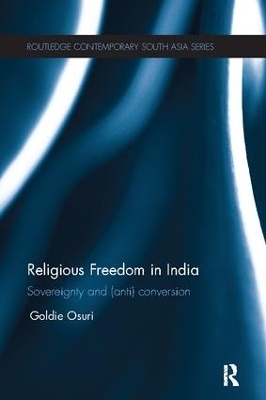
Religious Freedom in India
Sovereignty and (Anti) Conversion
Seiten
2017
Routledge (Verlag)
978-1-138-10923-0 (ISBN)
Routledge (Verlag)
978-1-138-10923-0 (ISBN)
Drawing on the critical and theoretical concepts of sovereignty, biopolitics, and necropolitics, this book examines how a normative liberal and secular understanding of India’s religious identity is translatable by Hindu nationalists into discrimination and violence against minoritized religious communities. Extending these concepts to an analysis of historical, political and legal genealogies of conversion, the author demonstrates how a concern for sovereignty links past and present anti-conversion campaigns and laws.
The book illustrates how sovereignty informs the making of secularism as well as religious difference. The focus on sovereignty sheds light on the manner in which religious difference becomes a point of reference for the religio-secular idioms of Bombay cinema, for legal judgements on communal violence, for human rights organizations, and those seeking justice for communal violence. This wide-ranging examination and discussion of the trajectories of (anti) conversion politics through historical, legal, philosophical, popular cultural, archival and ethnographic material offers a cogent argument for shifting the stakes and rethinking the relationship between sovereignty and religious freedom. The book is a timely contribution to broader theoretical and political discussions of (post) secularism and human rights, and is of interest to students and scholars of postcolonial studies, cultural studies, law, and religious studies.
The book illustrates how sovereignty informs the making of secularism as well as religious difference. The focus on sovereignty sheds light on the manner in which religious difference becomes a point of reference for the religio-secular idioms of Bombay cinema, for legal judgements on communal violence, for human rights organizations, and those seeking justice for communal violence. This wide-ranging examination and discussion of the trajectories of (anti) conversion politics through historical, legal, philosophical, popular cultural, archival and ethnographic material offers a cogent argument for shifting the stakes and rethinking the relationship between sovereignty and religious freedom. The book is a timely contribution to broader theoretical and political discussions of (post) secularism and human rights, and is of interest to students and scholars of postcolonial studies, cultural studies, law, and religious studies.
Goldie Osuri is Associate Professor at the Department of Sociology at The University of Warwick, UK. Her research interests include analyses of nationalisms and transnational movements in relation to race, gender, ethnicity, and religion through poststructuralist and postcolonial theoretical approaches.
1. (Anti) Conversion as Exception: Genealogies 2. (Anti) Conversion: Transnational Bio/Necropolitical Engagements 3. Sovereignty and the Indian Secular 4. What’s Love Got to do with it? Sovereignty and Conversion 5. Profaning Religious Freedom
| Erscheinungsdatum | 04.07.2017 |
|---|---|
| Reihe/Serie | Routledge Contemporary South Asia Series |
| Zusatzinfo | 6 Halftones, black and white; 6 Illustrations, black and white |
| Verlagsort | London |
| Sprache | englisch |
| Maße | 156 x 234 mm |
| Gewicht | 453 g |
| Themenwelt | Religion / Theologie ► Christentum ► Kirchengeschichte |
| Sozialwissenschaften ► Politik / Verwaltung | |
| Sozialwissenschaften ► Soziologie ► Spezielle Soziologien | |
| ISBN-10 | 1-138-10923-1 / 1138109231 |
| ISBN-13 | 978-1-138-10923-0 / 9781138109230 |
| Zustand | Neuware |
| Haben Sie eine Frage zum Produkt? |
Mehr entdecken
aus dem Bereich
aus dem Bereich
von Athanasius bis Gregor dem Großen
Buch | Softcover (2024)
C.H.Beck (Verlag)
CHF 18,90
eine Geschichte der christlichen Kunst
Buch | Hardcover (2024)
C.H.Beck (Verlag)
CHF 44,75


